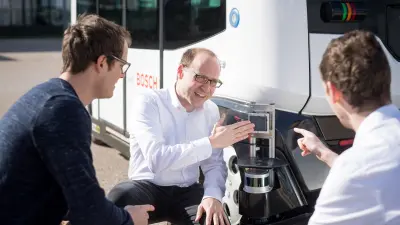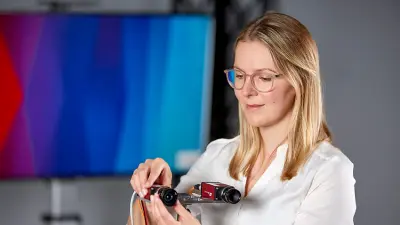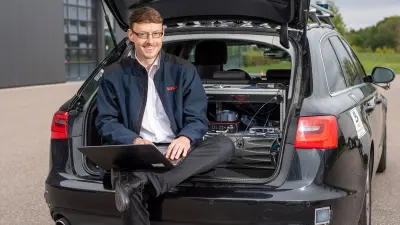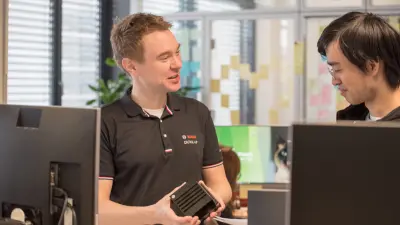Dr. Steffen Knoop
Chief Expert Automated Driving Systems

As an expert, I work on solutions for automated driving. I find it particularly exciting to look at the entire process chain from surround sensors and digital maps through perception and planning to actuator technology. Understanding and modeling these functional correlations in depth and testing them as prototypes are core aspects of my work. After completing a doctorate in robotics, I started researching driver assistance functions at Bosch in 2008. My work on automated vehicles — mobile robots — now brings me full circle.
Please tell us what fascinates you most about research.
As researchers, we develop new ideas, concepts, approaches, and solutions. To this end, we develop an in-depth understanding of the respective correlations without losing sight of the big picture. We experience this range every day within the scope of our research activities. I am inspired by putting ideas and concepts into context and challenging the status quo.
What makes research done at Bosch so special?
The interdisciplinary cooperation. For all of our activities related to automated driving, our team collaborates with outstanding experts from the areas of robotics, sensor development, and image processing, as well as future research and methods development, whereby I am particularly attracted by the combination of science topics and the potential of my work driving and enabling real products. I experience a very open atmosphere at Bosch Research, one distinguished by great mutual trust and the freedom to integrate and push individual ideas.
What research topics are you currently working on at Bosch?
For me, automated driving is one of the most exciting research fields today and one to which contributions are made by a wide variety of disciplines. During the course of my everyday routines, I concentrate on the process chain comprising sensors, localization, perception and fusion, planning, and digital map. One essential challenge during this process is to design the systems to be both performant and safe right from the start.
What are the biggest scientific challenges in your field of research?
The greatest challenge in the development of automated driving is to enable the step from monitored assistance systems to driverless vehicles: autonomous participation in road traffic requires progress in the areas of sensors, algorithms, for example, perception and planning, but also considerable changes regarding social perception and legislation. This necessitates not only achieving the safety and robustness of the systems but also verification thereof.
How do the results of your research become part of solutions "Invented for life"?
I am developing systems and components for automated driving applications in public transportation of people and goods. Accordingly, I am involved in transforming mobility and contributing to solving the major challenges for society associated with traffic today.
Curriculum vitae
2012
Advance developer of driver assistance, Development of video- and radar-based driver assistance functions, Bosch Research
2007
Research associate, Robotics, University of Karlsruhe, Professorship of R. Dillmann
2002
Guest researcher, KTH Stockholm, Research group of H. Christensen

Selected publications

Michael Bolle et al. (2017)
- Michael Bolle, Steffen Knoop, Frank Niewels, Thomas Schamm
- 17. Internationales Stuttgarter Symposium pp 531-545

Steffen Knoop et al. (2009)
- Steffen Knoop, Stefan Vacek, Rüdiger Dillmann
- Robotics and Autonomous Systems Vol. 57

Sven R. Schmidt-Rohr et al. (2008)
- Sven R Schmidt-Rohr, Steffen Knoop, Martin Lösch, Rüdiger Dillmann
- Proceedings of the 3rd ACM/IEEE international conference on Human robot interaction

Steffen Knoop et al. (2008)
- Steffen Knoop, Michael Pardowitz, Rüdiger Dillmann
- Journal of Intelligent and Robotic Systems Vol. 52
Get in touch with me
Dr. Steffen Knoop
Chief Expert Automated Driving Systems


